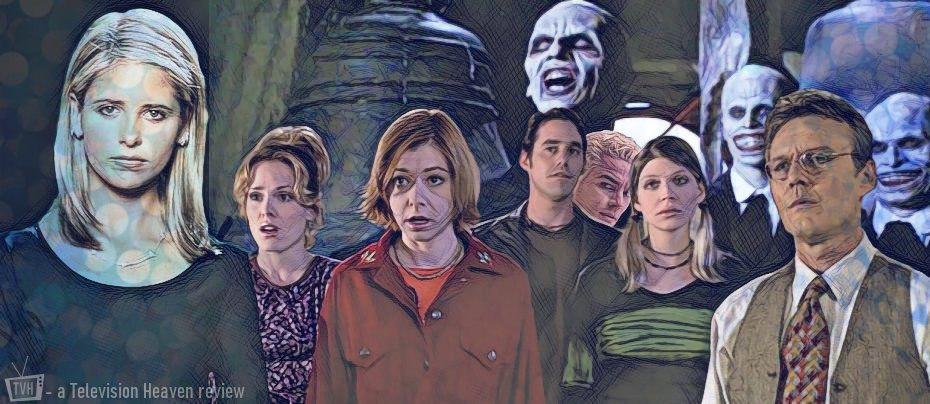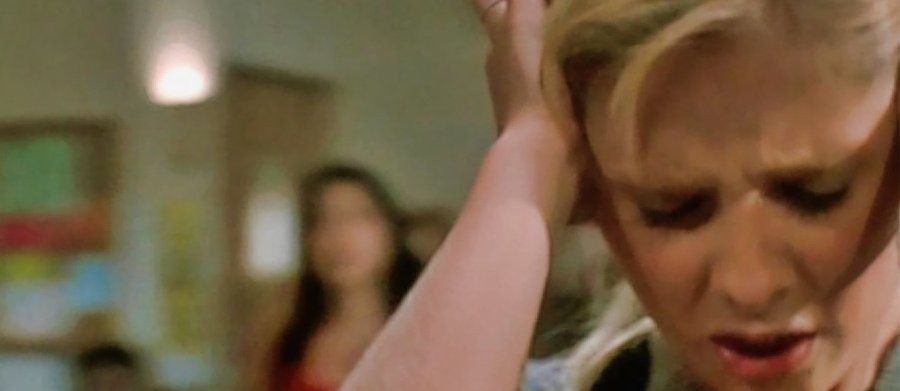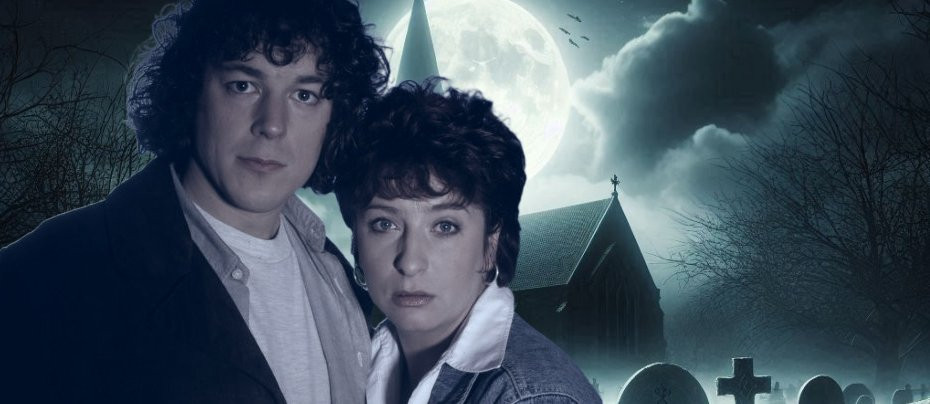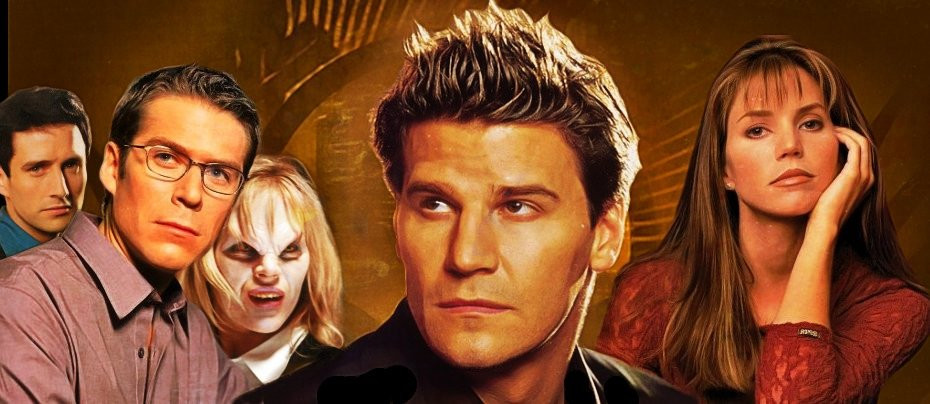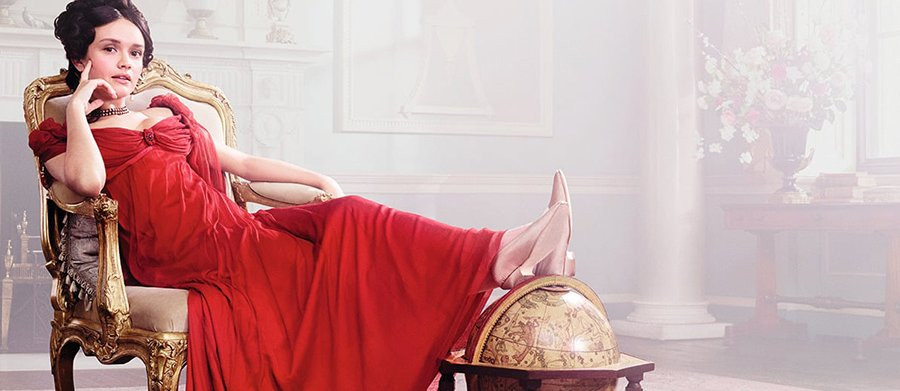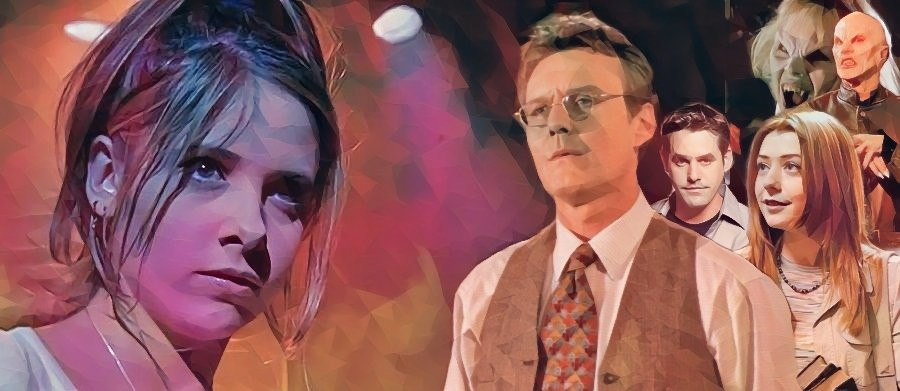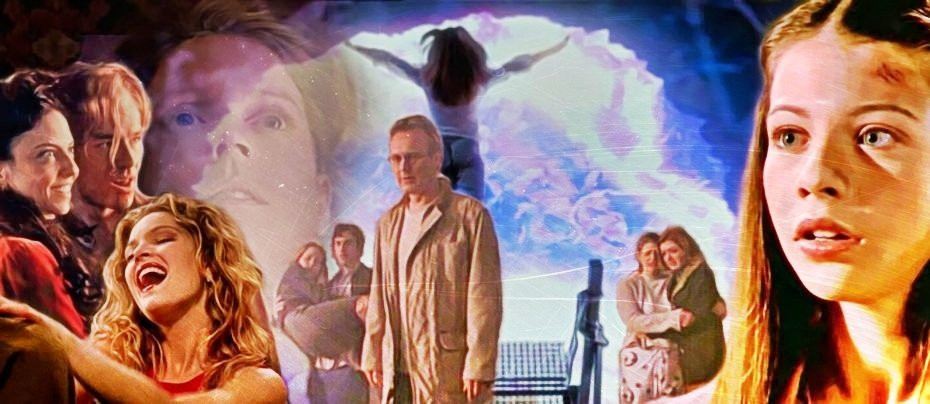
Buffy the Vampire Slayer - Season 5
Buffy the Vampire Slayer - Season five (2000-2001)
Reviewed by Daniel Tessier
Buffy's fifth season was very nearly its last. The series' early success had helped put young network The WB on the map, but by season four, ratings had begun to dip – not by much, but enough that the network lost confidence in their property. WB execs felt that the series had peaked and would only lower in quality and popularity from then on, which wasn't an unfair assessment. To continue the series beyond the originally contracted five seasons, the cast and creative team would demand higher salaries, and The WB wasn't willing to shell out.
Joss Whedon reduced his involvement further, writing and directing only three episodes this time round, with director David Solomon and writers Marti Noxon, Jane Espenson, David Fury and Douglas Petrie all receiving promotions up the producer hierarchy and steering the series further. Steven DeKnight (Spartacus) and Rebecca Rand Kirshner (Freaks and Geeks, Gilmore Girls) came onboard as new staff writers. The main cast, led by Sarah Michelle Gellar as the eponymous heroine, all continued, along with a new addition.
Negotiations over the future of the show continued behind the scenes while the fifth season was in production, but you'd not have guessed from what appeared on screen. After struggling to fully adjust to a new direction in its fourth year, the series got back on track with an impressive new run that embraced strong character development and threw in some brilliantly unexpected developments. The new season felt fresher and more confident compared to the year before, and while there were fewer individual stand-out episodes (although one in particular was truly exceptional), the season returned to a more consistent high quality.
The season starts with “Buffy vs. Dracula,” which is simultaneously the most obvious and most absurd idea for an episode. Noxon began to script the episode as an encounter with a sophisticated, Dracula-like vampire, who would show Buffy a darker side to herself. It was Whedon who pointed out that Dracula was now in the public domain, so why not just use Dracula?
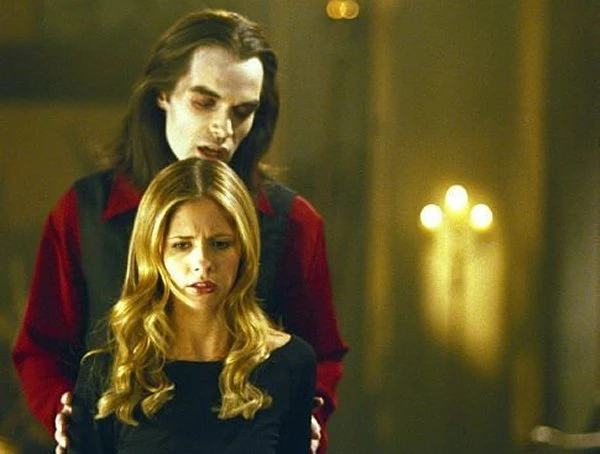
Rudolf Martin (Swordfish, All My Children) plays the Count himself, as a reserved, magnetic individual, decked out in the classic evening dress and pale facepaint that you'd expect Dracula to wear. The German actor had just filmed the title role for the TV film Dark Prince: The True Story of Dracula, an allegedly historical account of the life of Vlad the Impaler which nonetheless ends up with the Wallachian noble becoming a vampire. While it was broadcast after the Buffy episode, the two generated publicity for each other and provided a strange sort of continuity.
“Buffy vs. Dracula” goes all-in with the modern myth of the Count, riffing on as many tropes from the novel and the many, many adaptations as the writer could fit in. Inevitably, after so many parodies of the character, it's hard to take him entirely seriously, and the episode is largely played for laughs. Xander (Nicholas Brendon) is reduced to a spider-munching Renfield-like lackey, while Anya (Emma Caulfield) wistfully recalls a tryst with the Count some centuries earlier. Spike (James Marsters), on the other hand, can't stand him, considering them to be old rivals and furious that Drac's becoming famous means that now everyone knows how to kill vampires. Plus, he owes him eleven quid.
Giles (Anthony Head) falls under the spell of the Three Sisters who dwell in Dracula's lair, which, in one of the best jokes in the series, turns out to be a huge castle on the edge of town that somehow no one's ever noticed before. Having dismissed most of the Dracula clichés for its vampires, just this once the series embraces them. The Count is carted around in a coffin full of dirt, transforms into mist or a bat (thanks to some Romany magic) and when he is finally dusted by Buffy, he comes back, just like he always does.
In spite of all the silliness, the episode retains the dark tone that Noxon set out for it. Dracula succeeds in seducing Buffy to begin with, becoming the third vampire to feed off her and the first to actually feed her some of his own blood. Buffy has found herself sneaking out at night to hunt vampires, and Dracula senses this newly awoken dark side. This is a theme that will run through the season, as Buffy begins to lose touch with her humanity. The episode ends with Buffy coming to Giles, asking him to be her Watcher again so that she can understand her abilities and nature better, just as he was going to leave for England.
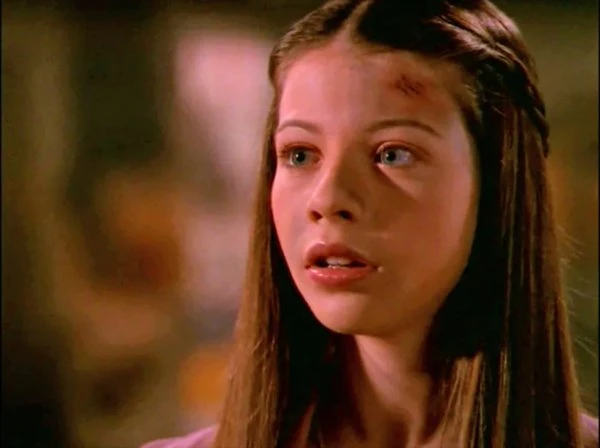
Well, that's not quite the end. The very end of the episode sees Buffy arrive back at her mum's house, only to find a fourteen-year-old girl going through her things. In a brilliantly bold move, the series introduces Buffy's little sister Dawn, and none of the characters act as if there's anything unusual about this. She's simply always been there – it's just that she hadn't always been there yesterday. Dawn is played by Michelle Trachtenberg, a huge fan of the series, who was previously a child star on Harriet the Spy, Inspector Gadget and All My Children (alongside Sarah Michelle Gellar and Rudolf Martin). Trachtenberg is immediately added to the title credits on her first full episode, 5.2, “Real Me,” cementing the idea that she's just part of the show.
Trachtenberg does remarkably well with Dawn, a character who is knowingly written to be quite annoying and hard to live with. Originally conceived as a twelve-year-old, the character was aged up to almost match the actress, and she's still written as a very immature character. Yet Trachtenberg makes her sympathetic, and even as her concerns are self-centred, it's hard not to feel sorry for her as the also-ran in Buffy's story. (Buffy, of course, sees it the other way round, and is old enough to know better.) “Real Me” also has the privilege to reintroduce Mercedes McNab as ditzy blonde vampire Privilege, who has managed to get herself minions (including the first appearance on the show for Tom Lenk, who'll be back as a more important character the following year).
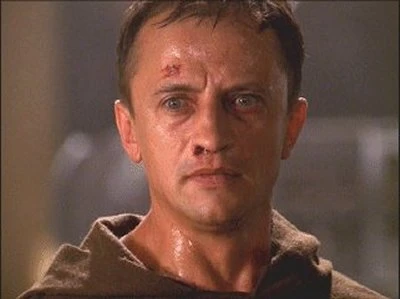
For all of Dawn's showy talk about how Buffy's in for a surprise if she thinks her sister's just a nobody, the teen has no more idea that she's anything mysterious than any of the other characters. The mystery runs for a while, but thankfully isn't drawn out too long. In 5.5, “No Place Like Home,” we find out what's going on. Russian actor Ravil Isyanov (NCIS: Los Angeles, Agents of SHIELD) puts in a remarkably moving performance as a mysterious monk who has fled to Sunnydale from a nameless Beast that has massacred his order. Throughout the last few episodes, there has been a rise in cases of insanity in the town, and those who have lost their minds are strangely drawn to Dawn, seeing her as something else. And in case that wasn't enough, their mother Joyce (Kristine Sutherland) has started experiencing debilitating headaches.
Concerned that someone or something is attacking her through her family, Buffy performs a spell to reveal any others magics that have been placed around her home. What she sees is Dawn, fading in and out of existence, along with her room, pictures of her and more. Confused but convinced that Dawn isn't really her sister, Buffy leaves to investigate further. The monk, with his last breath, confesses to Buffy that Dawn is actually a mystical Key, that his order made into human form and sent to the Slayer so that she would protect her. Rewriting reality so that no one would be any the wiser, the monks left the Key in Buffy's charge – now a real, human girl, with no idea she was ever anything else.
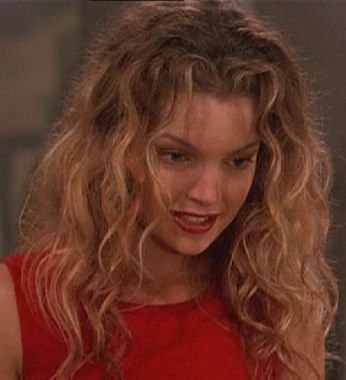
Buffy also faces the Beast for the first time, revealed to be... a beautiful blonde woman in a slinky red dress. Clare Kramer (In & Out, Bring it On) plays the new Big Bad, Glorificus, or Glory for short, an insane Hellgod from another universe, banished to Earth after losing a war with two other, slightly less awful Hellgods. Trapped in human form, Glory is spectacularly, hilariously self-centred, ridiculously vain and utterly unhinged. She is, perhaps, the ultimate Buffy villain, an even stronger, more unstoppable blonde bombshell, or perhaps more like an evil Cordelia. Physically by far the most powerful monster Buffy has faced, Glory is virtually unstoppable, and is desperate to get her hands on the Key so she can return to own realm, and she doesn't care who she has to squash to get it. Oh, and fighting a Vampire Slayer is just so common, you know?
Kramer's performance is brilliant from the moment she appears. She's entertaining when she's on top of her game, but genuinely unsettling when her sanity starts to fail, which is when the character becomes truly scary. When she needs a pick me up, Glory literally sucks the energies from the human mind to temporarily repair her own, digging her fingers into their brain to do so. The CGI looks dreadful but it's still chilling. The many resultant mental health patients now filling up Sunnydale Hospital are able to see past illusions, so only they can see Dawn's true nature (why Glory can't herself, or why she doesn't think of using one of them to find the Key, is another question).

Before this we have a couple of important episodes for other characters. In 5.3, “The Replacement,” Xander finally gets some genuine development towards adulthood when he moves out of his parents' basement and gets a new apartment with the money from his promotion at his new construction job. Inconveniently, Xander is split into two by a demonic shaman named Toth (experienced monster actor Michael Bailey Smith, Charmed). With one Xander embodying all the finer points of his persona, and the other... not so much... there's naturally all manner of opportunity for confusion and misunderstanding, but it comes to an almost deadly conclusion when the traumatised “lesser” Xander attempts to kill what he believes is his evil doppelganger.
There's some great material with the two Xanders, with Nicholas Brendon putting in one his very best performances in the series, along with some able support from his twin brother, Kelly Donovan (neither use their surname Schultz when acting). There's more serious stuff in there too, though. Xander's work in construction may seem prosaic when compares to his superpowered friends, but it allows him to finally discover his niche and develop a career, which in turn means he can better support Anya. Meanwhile, Anya, who was injured in the previous episode, has a crisis now that she has been confronted with her own mortality, something the ancient demoness never thought she'd have to face. Ultimately, the episode leaves Xander more assured and the couple stronger and with a better understanding of each other. Plus, we get the best use of a Star Trek (mis)quote in the series: “Kill us both, Spock!” (Referencing the 1966 episode “The Enemy Within,” as if you didn't know.)
5.4, “Out of My Mind,” is a less memorable episode in itself but lays important groundwork for the season. Giles gets a grip on his place in Sunnydale when he buys The Magic Box, the oft-raided magic shop in the town, which becomes a new headquarters for the Scoobies, and equipped with a new training room for Buffy. While Buffy's relationship with Giles is stronger than ever, her partnership with Riley (Marc Blucas) is faltering. Riley's character takes a downward turn in this season, as he struggles to cope with his own weaknesses. Buffy is no longer leaning on him like she used to, and the fact that she is stronger than him is hard for the macho military man to bear. It becomes clear that, so frightened is he of losing his own enhanced strength, Riley has been hiding serious medical problems from Buffy. He's now at the point that he either has surgery to undo the alterations made by the Initiative or his heart will give out.

While Riley gets fixed physically, his character continues to lose his way, his more noble sides overtaken by his need to prove his masculinity. He'll only fall further as the season progresses. Meanwhile, Spike decides he's had enough of Buffy for good, and recruits Harmony to force the Initiative surgeon to remove the neutering chip from his brain. It fails, and Spike's frustration and obsession with Buffy finally reach their culmination: he realises that he is hopelessly in love with her.
Revealing this in a dream sequence is a sloppy bit of storytelling, but it does allow the character to move in a new direction. Even with the chip in his head, having Spike remain as an uneasy ally was becoming hard to believe. His ongoing preoccupation with the Slayer, and his insistence on continually returning to Sunnydale, could only ever end like this: complete infatuation with her. It alters the dynamic between the characters in interesting ways and sets Spike on an uneasy path to redemption. Plus, it provides Riley with a love rival at the exact time he is incapable of coping the emotional threat.
Spike's story is explored in depth in 5.7, fan favourite episode “Fool for Love.” Buffy, still striving to understand more about her nature as the Slayer and suffering after a brutal attack by a nameless vamp, goes to Spike, the only vampire known to have killed two Slayers. Finally, we get Spike's origin story. Spike, taking the opportunity to show off, explains that he's “always been bad,” but what we see on screen isn't exactly what he's telling the Slayer. In flashback to the late 1880s, we discover that young William was an effete, aspiring poet, hopelessly in love with the unattainable Cecily (Kali Rocha – Liv and Maddie), who shatters his hopes brutally. Wonderfully, William the Bloody's nicknames derive from his “bloody awful poetry,” and one of his many critics claiming that he'd rather have “a railroad spike through (his) head” than listen to it. (No doubt this gave William ideas when he decided to get his own back.)
Heartbroken, William storms out and straight into the path of Drusilla (Juliet Landau), who sees something in him and transforms him into a vampire. What follows is a whistle-stop tour of Spike's 120 years of vampiric chaos, as we see him take on his new, arrogant, swaggering persona, and his fierce rivalry with Angel (David Boreanaz). These scenes tie in to the parallel story in Angel's second season, exploring the history of “the Whirlwind” - the deadly gang of Darla (Julie Benz), Angel, Drusilla and Spike. Brilliantly, certain scenes are shown from Spike and Drusilla's point of view in “Fool for Love,” and Angel and Darla's in Angel 2.7, “Darla.” It's subtly done but shows a vast difference in how the different vampires perceive the events.

We continue through Spike's life, watching as he kills his first Slayer (stunt artist Ming Qiu) in China during the Boxer Rebellion, and his second (April Weeden – Bones, Dragnet) in a subway train in the 1970s (from whom he steals his iconic leather coat). Buffy remains disgusted by his boasting, and rejects Spike when he tries to kiss her, echoing his earlier rejection by Cecily. In the final scene, Buffy sits crying having learned her mother is more ill than she thought, while Spike, who was determined to kill her however much pain it caused him, sits down to comfort her. It's a great illustration of the twisted but strangely touching relationship they will begin to develop, and a perfect end to an excellent episode.

Buffy really gets put through the emotional ringer in this season, as her love life collapses, her mother is diagnosed with a brain tumour, and her sister turns out to be a figment who needs her protection. 5.8, “Shadow,” is a so-so episode that's let down by a random snake monster, but progresses the overall plot, with Joyce's illness investigated, Riley's self-esteem plummeting further and Glory making some small headway in locating the Key. It also introduces Ben (Charlie Weber – Underemployed, How to Get Away with Murder), a terribly nice, handsome hospital intern who is introduced as a potential new love interest for Buffy. On the less attractive side of things, we get to meet Glory's fawning, goblin-like minions for the first time, who go by names like Dreg, Jinx and Murk. More impressive is the following “Listening to Fear,” a frankly terrifying horror story which sees a Queller demon crash to Earth in a meteorite, charged with eliminating the many insane people who are filling up Sunnydale due to Glory's feeding frenzy.

The Queller is one of the most horrifying monsters in the entire franchise, a slug-like, chitinous, barely humanoid thing that silently hangs off the ceiling waiting to drop screaming onto its victims, smothering them in some kind of ectoplasm. Riley reverts to soldier mode, bringing in his military contacts to help track down the extra-terrestrial demon. The creature makes its way to attack Joyce, delirious due to her tumour, and almost kills her. In the aftermath, her half-mad experience means she knows that Dawn is the Key – but she makes Buffy promise to protect her as if she were their flesh and blood. Previously, Buffy only kept Giles in the loop about Dawn – the rest of the gang are told in short order though. Sutherland puts in an amazing performance throughout. The final revelation, that Ben summoned the Queller, thickens the plot nicely.
Riley's brush with the military tempts him back to the fold. In 9.10, “Into the Woods,” the demon-hunting not-Initiative-honest soldiers remain in Sunnydale, and try to convince him to re-enlist with them on deep cover mission to Central America. Spike, showing stalking skills that would make Angel proud, follows Riley as he leaves Buffy's bed in the middle of the night to a vampire brothel, where he's been getting regularly nibbled on for the rush – and in a desperate attempt to become the sort of dark, dangerous man Buffy usually goes for. Spike shows Buffy what he's found, pretty much destroying their relationship. At the end of his rope, Riley confronts Spike (who only Riley has realised is obsessed with Buffy), leading to a great scene where they sit down and commiserate each other over a beer.
Riley leaves Buffy with a cruel ultimatum: prove to him that she needs him, the way the hungry vampires did, or he's leaving with the army tonight. Surprisingly, Xander proves to be the most mature person in the group. Having forged a pretty strong friendship with Riley by now, he steps in and speaks to Buffy, convincing her that she's been treating Riley like the convenient rebound guy all along, when he's clearly the one she's meant to be with and has given up everything for her. Whether they're truly meant to be together we'll never know; Buffy fails to make the rendezvous in time, and Riley leaves forever.
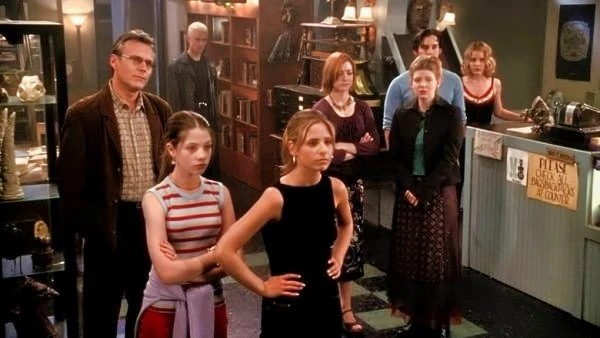
The rest of the gang's relationships become more complicated in the meantime. Tara (Amber Benson) has never really felt like she was part of the group, but that changes in 5.6, “Family,” an unremarkable but fairly solid episode, one of Whedon's three for the season. Tara's family turn up out of the blue, including her overbearing father (Steve Rankin – Pearl Harbour, Blue Streak), her obnoxious hick brother (Kevin Rankin (no relation) – Six Feet Under, Trauma, Unforgettable) and her callous cousin Beth (a pre-superstardom Amy Adams). In an obvious but effective allegory of conservative Christian communities across America, Tara's family have come to take her home to fulfil her role as a woman of the house and look after the menfolk. It's a bit different this time round, with the men having convinced the women over the generations that they're cursed to become demons when they reach their twentieth birthday. With their condemnation of Tara's witchcraft, always a metaphor for her sexuality, the allegory is pushed further, as is Tara's fear of being “outed” as a demon. Not the greatest episode, but memorable for the heartening scene where the Scoobies band together to stand up for Tara and force her family to get out.
Tara almost gets the gang killed when she tries to hide her supposed demon side with a spell – rendering some demonic assassins invisible – but it's Willow who really starts pushing her luck with her magic in this season. There are a few moments where the cracks in their relationship start to show, hinting at more difficult times to come. Willow comes off worst in 5.11, “Triangle.” She's been antagonistic to Anya throughout the season, still possessive of Xander in spite of all that's changed, and now she's helping herself to stock from the Magic Box while Giles is away. Anya, now working at the shop (and loving every second of the capitalism), stands up to Willow when she's attempting a dangerous spell. The result: she accidentally summons up a huge, brutal troll named Olaf (Abraham Benrubi – ER, Parker Lewis Can't Lose) who rampages through Sunnydale. Oh, and Olaf is Anya's ex – she turned him into a troll as her first act of vengeance when he cheated on her in the ninth century. A silly episode, but a fun one.
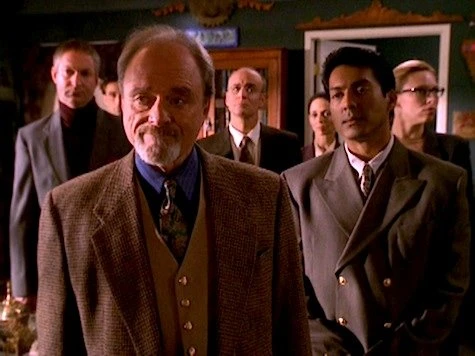
Mid-season, major events occur in 5.12, “Checkpoint,” and 5.13, “Blood Ties.” The former sees Harris Yulin return as Quentin Travers, the head of the Watchers' Council, arriving in Sunnydale with his entourage to test Buffy in order to see if she is worthy of the vital intelligence they have on Glory. In a triumphant reversal, Buffy realises that as the Slayer and the only one who can face Glory, she has the power in the situation, and forces Travers to re-hire Giles as her official Watcher (with full retroactive back pay!) and give her all the information he has. It's another of the many episodes that represents an important coming-of-age moment for the heroine. “Blood Ties,” on the other hand, is catastrophic for her, as Dawn, acting up, breaks into the Magic Box and discovers from Giles's diaries that she is the Key. Faces with a monumental existential crisis, Dawn enters a desperate depression, self-harming then running away. Trachtenberg gives a very strong performance in the episode. Dawn ends up sheltering in the hospital with Ben, who is revealed to be nothing less than Glory's human host body, when he spectacularly morphs into her. Fortunately for Dawn, Glory isn't privy to Ben's thoughts or knowledge; less fortunately, a spell prevents anyone from remembering the truth about Ben's identity.
Spike, meanwhile, slowly comes to grips with his infatuation with Buffy, in spite of being back with Harmony. His awkward attempts to wangle dates with Buffy, his stalking of her in her home, and his bizarre Buffy shrine all point to an increasingly desperate obsession with her. 5.14, “Crush,” sees Spike finally admit his feelings to Buffy, who is horrified. When Drusilla turns up in Sunnydale again (fresh from causing mayhem on Angel), she revives Spike's bloodlust and kills for him so he can feed, but all this does is tip him over the edge. He abducts both Dru and Buffy and confronts both of them, offering to kill Dru to prove his love for the Slayer. Dru, for her part, believes Spike's love immediately, having recognised his obsession with Buffy long ago. Buffy violently rejects Spike, who is then attacked by the furious Harmony. The two heartbroken vampiresses leave; Harmony heads for L.A. where she appears in Angel 2.17, while Drusilla makes no more appearances in the franchise save for illusions and flashbacks.
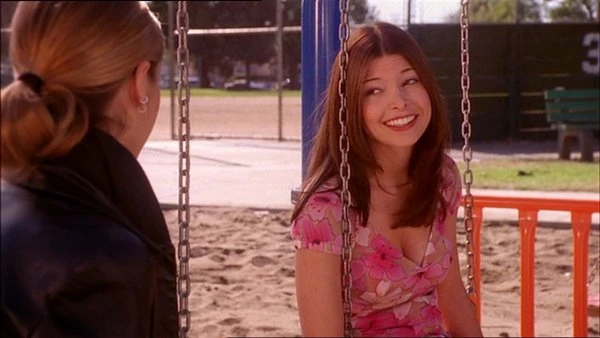
This follows directly into “I Was Made to Love You,” at first glance a standalone episode which turns out to have major knock-on effects for the series. Shonda Farr (Maybe It's Me) guest stars as April, an inhumanly strong young woman searching for her missing boyfriend Warren. April turns out to be a robot, created by Warren (Adam Busch – Point Pleasant, The Jury, Altered Carbon) to be his perfect girlfriend, until he abandoned her to date a real person. Busch puts in a solid performance as the somewhat creepy Warren, who will become far more sinister when he returns the following season. Amelinda Embry is also good as his girlfriend Katrina, who will also be back. It's Farr who makes the episode, though, with an excellent performance as the sweet and naïve, yet extremely dangerous April. The episode, largely played for laughs, develops sadly as April shuts down... only to end on a truly devastating note when Buffy comes home to find her mother lying dead on the couch.

This leads directly into the Whedon-helmed episode 5.16, “The Body,” inarguably one of the best and most impactful episodes of the series and the franchise as a whole. Joyce's illness throughout the season added a painfully real element of tragedy to the ongoing story – a brutal and mundane threat that Buffy couldn't fight. In spite of having a successful operation to remove her tumour, Joyce dies suddenly from delayed complications, alone in her home. After witnessing, and even experiencing, death again and again throughout the series, Buffy and her friends are suddenly confronted with the natural, irreversible, and inescapable death of a loved one, and it is a powerful loss to them all.
The plot to the episode is extremely straightforward, simply following Buffy as she deals with her discovery of the body and has to tell her sister and friends about the death. It's the individual reactions of the characters that make it so powerful, realised by truly exceptional performances by all the regular cast. Buffy moves from panic through denial to grief; Dawn is overcome with sadness; Xander erupts into brief but focused anger; while Giles sits alone listening to the song he and Joyce enjoyed together back in “Band Candy.” It is, surprisingly, Anya who has the most moving scene, as she, in her characteristically blunt and ill-informed way, asks questions about what is supposed to happen and how she is supposed to deal with it. The scene moves from Willow criticising her for her apparently uncaring attitude to a sudden mutual understanding of each other's grief. It's the one moment in the episode that, unfailingly, makes me cry when rewatching it.
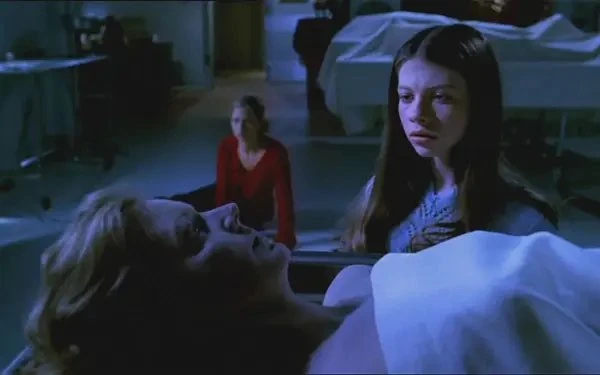
The episode is played largely without music, emphasising the reality and mundanity of the story, and it is in fact far quieter than the famously “silent” episode “Hush,” in which music was given a prominent role. Whedon focuses on tiny, boring and unpleasant details: Buffy fixing Joyce's skirt as she lies dead; Buffy vomits in the background of a scene that focuses elsewhere; Xander gets a parking ticket and is briefly annoyed. It all adds to the realism of the story. Other moments are deliberately placed to take the viewer out of the reality, to follow Buffy's experience: a flashback to a happy Christmas dinner; a disjointed contrast between the doctor's spoken words and the played-over dialogue of what he really means. Altogether, it's a stark, almost surreal experience for its sheer impact.
Whedon had himself lost his mother to a brain aneurysm and has spoken about how important this episode was for him, and how hard it was to create. He specified in a later commentary that a single scene – in which Willow panics trying to choose an appropriate outfit to wear to the hospital – was inspired by a similar experience he had before a funeral and was extremely difficult for him to film. Notably, though, there are elements that have nothing to do with his own experience but are included as essential to the characters. Significantly, Willow and Tara finally kiss, a move that was, predictably, contested by the network but which Whedon insisted upon. It's a perfect time to finally show the characters kissing: entirely a comforting gesture, with no danger of sexualisation or titillation being imposed upon it.
If there's anything wrong with “The Body,” and it's clutching at straws to find something, it's Buffy's fight with a vampire in the hospital morgue, which pulls the episode back into standard Buffy territory when, for once, it wasn't needed at all. Yet even this, in its way, emphasises the reality of life carrying on after a death, as for Buffy, fighting vampires is ordinary, everyday life. With this arguable flaw accepted, “The Body” remains an absolutely beautiful, astonishingly powerful piece of television. One of the best episodes, not just of Buffy, but of modern television.
Buffy is left reeling after Joyce's death, now having to shoulder the responsibility of looking after Dawn alone on top of everything else. The remaining episodes of the season push the overarching plotline forward in a serialised style, building to the inescapable climax. 5.17 “Forever,” sees Dawn dealing poorly with her mother's death, asking Willow and Tara to help her resurrect Joyce. Tara outright refuses, saying that it is against the natural order and incredibly dangerous, and while Willow sort-of agrees, her growing overconfidence, even arrogance, leads to leave a restricted spellbook out for Dawn to discover. Spike becomes involved when he bumps into Dawn as she's absconded into town; not wanting her to get hurt (and also being fond of Joyce himself), he agrees to help her on the agreement that she doesn't tell Buffy. It leads to a powerful scene in which Dawn raises something, which reaches the Summers' house and knocks at the door before Dawn panics and ends the spell. “Forever” sees Buffy and Dawn at their most antagonistic and also their closest as they work through their grief together. It's also notable for a brief appearance by Angel, returning to Sunnydale to comfort Buffy, and the introduction of veteran performer Joel Grey (Cabaret, Wicked, Tick, Tick...Boom!) as the seemingly benevolent demon Doc.

Episode 5.18, “Intervention,” starts silly but becomes both brutal and moving in equal parts. Spike, having charged the creepy Warren with a commission, now has his own “Buffybot,” designed to be his perfect plaything. Gellar puts in a spectacular performance as the robot, who's cheerful to the point of irritation, obsessed with Spike and just full of handy facts about the Scoobies (Willow is on file as “recently gay,” and she calls Giles “Guiles” due to some sloppy programming). Meanwhile, the real Buffy and Giles go into the desert so that the Slayer can undergo a vision quest to better understand her nature. Sharon Ferguson appears again as the First Slayer who comes to Buffy in her vision. Naturally, all manner of hilarious misunderstandings ensue!
While Buffy is away, Glory's minions, having learned that the Key is a human, jump to the conclusion that it must be Spike when they see how close the (robot) Slayer and the vampire are. There follows an absolutely brutal torture scene in which Glory, knowing that something as impure as a vampire could never be the Key, nevertheless interrogates him to find out who is. Marsters is incredibly in the scene, but the culmination of the episode is even better, and sees the first real steps in his relationship with Buffy. Assuming that he will have sold her out to the Hellgod, Buffy pretends to be her robot double to try to get the truth from Spike, only to find out that he withstood torture in order to keep her and Dawn safe. The two share a kiss – their first real, uninfluenced kiss – and Buffy promises to never forget what he did for her. It's an episode that sees Spike at his creepiest and most maladjusted, yet also at his most noble – a real turning point for the character.
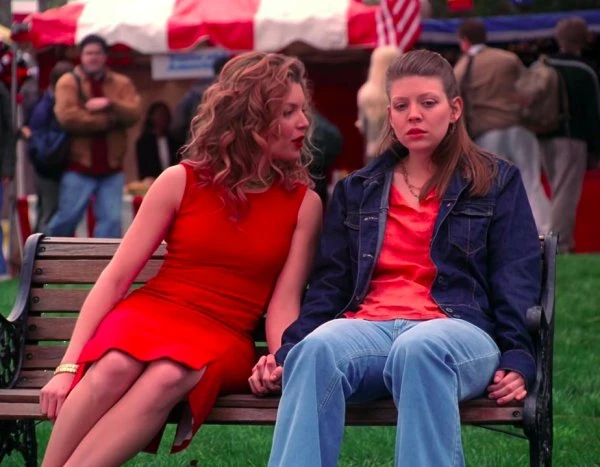
The final four episodes push relentlessly ahead, each one dealing a crushing blow to the group. “Tough Love” sees Buffy struggling with her parenting of Dawn, while Tara and Willow clash over the latter's increasingly reckless use of magic. Following their first major fight, Tara takes off to the local fair, where she is cornered by Glory, under the impression that this new addition to the team must be the Key. After brutally injuring her, Glory is angered to realise that Tara is nothing but an ordinary human, and proceeds to feed on her sanity, leaving Tara helpless and afraid for the rest of the season. It's one of the most brutal fates to befall a regular character, and even though Willow eventually manages to reverse it, it's devastating for her as well. Amber Benson gives an astonishingly good performance as the mentally damaged Tara, never going over the top but always unpredictable and sympathetic.
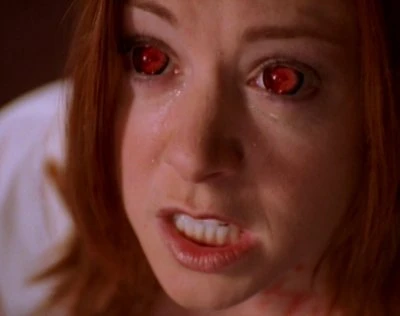
Willow immediately goes on the rampage, hunting down Glory and attacking her with the full might of her powers. While she's no match for the Hellgod, Willow does deal some damage, and the episode as a whole foreshadows her descent in season six. Buffy manages to rescue Willow, but Glory follows them, tearing an entire building apart to get to them, and finally discovering in the process that Dawn is the Key. This continues directly in “Spiral,” in which the gang goes on the run in an RV (sun-protected for aid of Spike, of course), fleeing from both Glory and the Knights of Byzantium, a seemingly inexhaustible army of men sworn to destroy the Key lest it fall into the Hellgod's hands. We finally learn why Glory wants the Key, and what it does: Glory was exiled from her home realm and simply wants to return, and to do so, will use the Key to tear down all the walls between realities, resulting in hell on Earth.
Now that the Key is in human form, activating it means that Dawn will need to be bled, with the walls between worlds only returning when her blood stops flowing. At the end of “Spiral,” Dawn is taken by Glory, after Buffy makes the critical mistake of calling Ben to their location to tend to an injured Giles. (The responsibility is on Ben, of course, who is fully aware of Dawn's identity and still takes his Glory-possessed self out to her.) The shock of losing Dawn to the enemy is too much for Buffy after all she's been through, and she breaks down, entering an almost catatonic state. Willow spends much of 5.21, “The Weight of the World,” magically entering Buffy's mind to help her come to terms with the defeatism that is overtaking her. Dawn is left with an increasingly unstable Glory/Ben, who are gradually losing their separate identities, which at least means that people can remember the link between them.
All this leads to “The Gift,” the final episode of the season and the hundredth episode of the series as a whole. Its position as the original finale of Buffy is obvious, beginning as it does with an epic “previously on...” reprise that takes the viewer from the very first episode through each proceeding instalment with increasing speed, before crashing into a run-of-the-mill vampire slaying. Buffy's barely even interested in the fight, highlighting how far she and the show have come over the last five years.

As Glory sets her minions and enslaved madmen from the town to building a tower to reach the perfect point for ritualistically bleeding Dawn, Buffy and the gang look desperately for a way to fight her. First though is the fight within the group, as Giles, armed now with full knowledge of the Key's nature, tries to get Buffy to face up to an inescapable fact: if she can't rescue Dawn before the bloodletting, the only way to stop the apocalypse will be to kill her. If Dawn lives once the walls are down, chaos and torment will envelop the Earth, and everyone will suffer, including Dawn.
Buffy simply cannot accept that she has to kill Dawn and vows she will kill anyone who tries to do so. (As she points out, she's made similar sacrifices before, killing Angel to save the world, although at least that time it was his fault.) The Scoobies manage to put together quite an arsenal to take on the Hellgod and her worshippers, including Olaf the troll's mighty hammer and the reprogrammed Buffybot. Everyone enters the fray in the climactic battle, with Willow dealing a decisive blow when she rips Tara's sanity back out of Glory's head – restoring Tara and weakening the Hellgod. There's a real punch-the-air moment when Xander uses his super-construction-man skills to knock Glory for six with a wrecking ball. Ultimately, though, the battle isn't enough, and while Glory is briefly incapacitated, Doc, revealed to be one of her worshippers, cuts Dawn and begins the bloodletting.
As rifts between realities appear, in a visually spectacular sequence with some truly remarkable monsters making the briefest of appearances, Buffy is faced with having to choose between Dawn and the world. In the moment, though, she puts together the pieces she has been learning throughout the season: that Dawn was made from her (in spite of Gellar and Trachtenberg looking nothing alike), and the chilling claim that “Death is her gift,” repeatedly told to her by everyone from Spike to Dracula to the First Slayer herself. Buffy realises at last what this means, and reasoning that it is her own blood that flows through Dawn's veins, throws herself into the rift and down onto the ground below. With Buffy's death, the ritual is ended, thanks to her link to Dawn, and the world is saved.
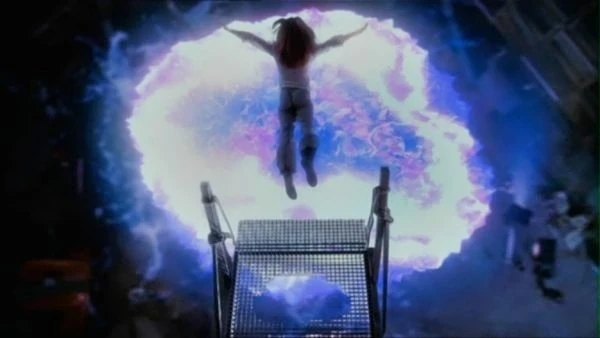
A running theme through the season is what it means to be a hero. As a hero, Buffy is constrained by morals that prevent her from taking an innocent life, but empowered by her own sacrifice. This is thrown into contrast against Giles, most definitely a good man but also a more morally flexible one. Where Buffy tells the wounded Ben, the beaten Glory still within him, that he must leave and stay away from Sunnydale, surely knowing that Glory will resurface one day and seek revenge, Giles deals with him swiftly and brutally, showing no remorse for killing for the greater good. The season's more prevalent theme, though, is family. Buffy loses her mother but gains a sister, her role in her family changing finally from child to parent figure, while the status of her friends as her extended family is reinforced. While the final battle against Glory isn't the best fight scene the series has presented, the coming together of the whole group to defeat her embraces both these themes.
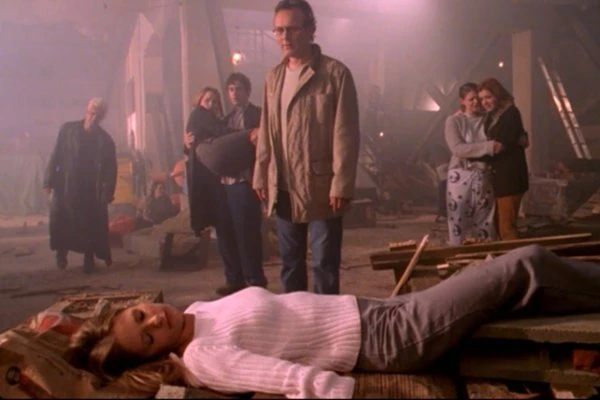
“The Gift” is an excellent finale for the series, the final scene settling on Buffy's grave bearing the epitaph: “Buffy Anne Summers. 1981-2001. Beloved sister. Devoted friend. She saved the world a lot.” It's pretty perfect and sums up the series beautifully, and the episode would have served very well as a final instalment. In the event, the series was picked up by rival network UPN, owned by Paramount, and renewed for a sixth and eventually seventh season. (Angel, in the meantime, continued on The WB.) In spite of some ground-breaking episodes in the final two seasons, Buffy would never quite reach the heights it had in its WB run.
Published on August 12th, 2022. Written by Daniel Tessier for Television Heaven.




